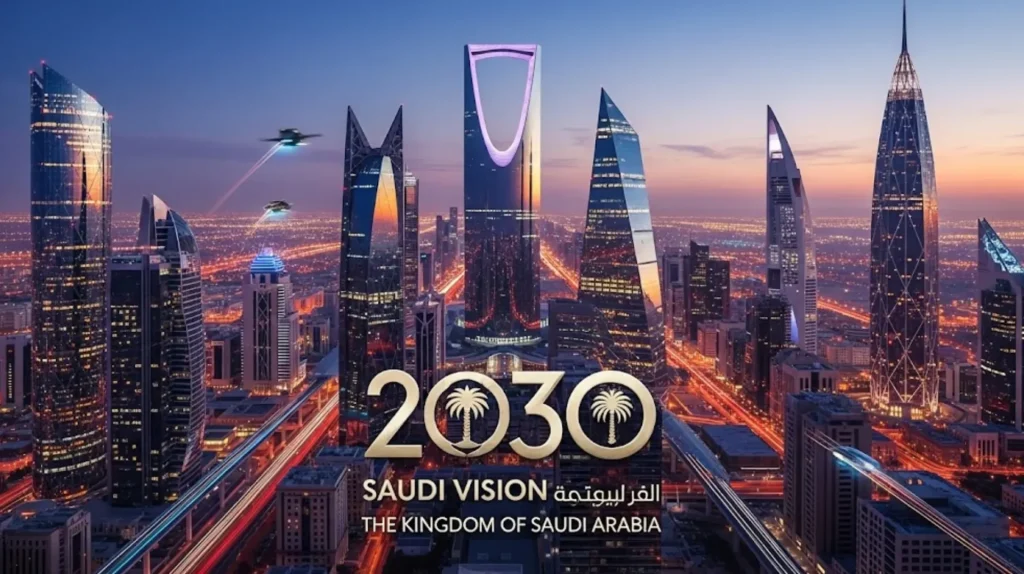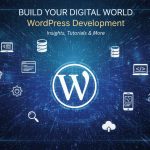Saudi Vision 2030: The Kingdom’s Path To A Modern Future
Saudi Vision 2030 is an ambitious initiative released in 2016 to make the Kingdom of Saudi Arabia a modern, diverse, and sustainable nation. This is aimed at diversifying the heavily oil-dependent economy in the country and developing a better economy based on the tourism industry, technology, education, and innovation. Among these major targets is the improvement of non-oil government revenue, which is currently at SAR 163 billion to SAR 1 trillion by the year 2030. The road map also intends to improve the 40% contribution of the economy by the private sector to 65% and cut down unemployment to 7%. Vision 2030 is on a journey towards a prosperous and vibrant future with projects such as the NEOM, the Red Sea tourism development, and more funding toward small businesses and women in the workforce.
A Shift In National Strategic Paradigm
The Saudi Vision 2030 is a significant change in the national strategic thinking of the Kingdom in the long run. For many decades, the economy depended on the export of oil. Still, as the oil prices fluctuated and a more viable future was required, the government saw the need to change. Vision 2030 is a paradigm shift in a new direction towards economic, social, and cultural development. This national strategy is centered around three key pillars:
- A vibrant society: preserving culture and improving quality of life.
- A thriving economy: creating jobs and supporting business growth.
- An ambitious nation: increasing government efficiency and citizen engagement.
It is meant to also restructure the role of the government as an operator to a regulator and empower the private sector and people to propel the growth of an individual country.
Investment And Economic Diversification
Diversification of the Saudi economy and attracting local and foreign investment are one of the main targets of Vision 2030. In this regard, the Kingdom is investing in emerging industries and economic sectors that will decrease its dependency on oil revenues. Key focus areas for economic diversification include:
- Tourism: Increasing international visitors to 100 million annually by 2030.
- Renewable Energy: Investing in solar and wind energy to meet 50% of energy needs from clean sources.
- Technology and Innovation: Developing a knowledge-based economy with support for startups and R&D.
- Mining and Manufacturing: Unlocking new opportunities in untapped sectors.
This transformation centers around the Public Investment Fund (PIF), which has over $700 billion in assets. It is investing in strategic initiatives, sponsoring startups, and establishing international networks to attract additional funds and talent.
NEOM: One Of The Jewels Of The Saudi Vision 2030
NEOM is one of the biggest and most futuristic projects of Vision 2030. It was announced in 2017, and is one of the planned transnational smart cities, situated in the province of Tabuk in north-west Saudi Arabia and spread across an area of 26,500 square kilometers. Key features of NEOM:
- The Line: A 170 km linear city with no cars, streets, or carbon emissions.
- Oxagon: A floating industrial city, focused on advanced and automated industries.
- Trojena: A mountain tourism destination that will offer skiing, adventure sports, and nature experiences.
- Sindalah: A luxury island destination aimed at attracting high-end tourism from around the world.
It is assumed that NEOM will contribute 48 billion to the Kingdom’s GDP by 2030 and will generate more than 380,000 jobs. The whole thing will be powered with renewable energy and be an AI, biotech, clean energy, and sustainable living hub. NEOM is the future vision of Saudi Arabia as a pioneer of innovation and sustainability with the most advanced infrastructure.
Tourism And Culture: Key Pillars Of Economic Growth
Tourism and cultural heritage are considered as one of the backbones of economic diversification in Saudi Arabia as a part of its Vision 2030. Once closed to international travellers, the Kingdom is opening up with the aim of seeing 100 million visitors each year by 2030. This transition will not only increase non-oil incomes but will also provide thousands of new jobs. Key initiatives include:
- Launch of the Saudi eVisa in 2019, allowing visitors from over 50 countries.
- Development of heritage sites like AlUla, Diriyah, and the Red Sea coast.
- Seasonal festivals such as Riyadh Season and Jeddah Season are attracting global tourists.
- Support for arts and entertainment, including cinemas, music concerts, and museums.
Culture is no longer simply preservation; it is an expanding business. The Saudi Ministry of Culture has initiated more than a dozen cultural commissions to advance music, literature, architecture, and fashion in support of the nation in global perception and soft power.
Women And Youth Empowerment
Women’s and youth empowerment is one of the most radical elements of Vision 2030. Over 63% of the Saudi population is aged below 30 years, making it necessary to invest in the future generation of the Kingdom of Saudi Arabia.
Women Empowerment
- Women are now allowed to drive and travel without male guardianship.
- Labor force participation among women increased from 17% in 2016 to over 36% by 2022.
- Support for female entrepreneurship, including access to funding and business training.
Youth Empowerment
- Educational reforms to better align with market needs, especially in STEM fields.
- Youth programs and internships are designed to equip them with practical skills.
- Encouragement of innovation through startup hubs and incubators like the Misk Foundation.
Such changes not only enhance equality but also they have enhance economic productivity and social development.
Green Initiatives And Sustainability
The goal of Saudi Arabia under its Vision 2030 is to be sustainable. Being one of the biggest oil producers, the Kingdom is aware of the necessity of environmental responsibility and cleaner energy in the world. Consequently, it has introduced a number of green initiatives that would help deal with climatic changes and the need to conserve natural resources.
Key Green Programs
- Saudi Green Initiative (SGI) aims to:
- Plant 10 billion trees across the Kingdom.
- Increase protected land areas to 30% of total land.
- Cut carbon emissions by more than 278 million tons per year.
- Middle East Green Initiative (MGI) promotes regional cooperation for climate action.
- Investment in renewable energy, with a goal to source 50% of energy from renewables by 2030.
- Smart and sustainable cities, such as NEOM and The Line, are built with zero-emission infrastructure.
Such measures are an indication that Saudi Arabia is willing to be a front-runner in a world trend of being environmentally conscientious, trying to create a harmony between economic expansion and environmental conservation.
Innovation And Transformation Of Education
As part of Vision 2030, Saudi Arabia is transforming its education sector to develop a knowledge-based society that would be able to face the needs of the future. The government is working on connecting technology, developing critical thinking, and harmonizing education with the demands of the job market.
Key Educational Transformations
- Curriculum reforms that emphasize science, technology, engineering, and mathematics (STEM).
- Increased investment in digital education platforms and smart classrooms.
- Partnerships with top international universities to bring global knowledge to local institutions.
- Vocational training programs help students get ready for technical jobs. These jobs are in new fields like AI, cybersecurity, and renewable energy.
In 2023, over 60% of students used digital platforms for learning. This shows that the education system will modernize quickly. Education today is not restricted to degrees alone but to producing a flexible and skilled future citizenry.
Smart Cities And Infrastructure
Saudi Arabia is creating a smart energy and great infrastructure future. Vision 2030 favors mega urban development projects with a mix of sustainability, digitalization, and innovation.
Notable Smart City Projects
- NEOM: A futuristic city with AI-driven systems, autonomous transport, and renewable energy.
- The Line: A zero-carbon, linear city with no cars and complete reliance on clean energy.
- Qiddiya: An entertainment and sports city aimed at diversifying leisure and tourism.
- King Salman Park and Diriyah Gate: Reviving culture and green spaces in urban areas.
Key Infrastructure Goals
- Modernize transport with high-speed rail, metro systems, and smart highways.
- Upgrade digital infrastructure to ensure 100% internet coverage in urban and rural areas.
- Develop smart utilities for water, energy, and waste management.
These projects focus on both physical improvements and enhancing residents’ quality of life. They also aim to boost the economy by promoting innovations.
Privatization For A Competitive And Investable Economy
Vision 2030 highlights privatization. It reduces government roles and lets the private sector lead. The change is expected to raise efficiency, cut down government expenditure, and open up to foreign investment.
Strategic Goals Of Privatization
- Raise over $55 billion through the sale of public assets.
- Open 16 major sectors to private investment, including healthcare, education, and utilities.
- Boost private sector contribution to GDP from 40% to 65% by 2030.
- Improve service delivery by leveraging private sector innovation and competitiveness.
That can be the Privatization of airports, water, flour mills, and even parts of the education system. These shifts are introducing new technology, improved services, and increased employment to Saudis.
Regional Leadership And Global Partnerships
Vision 2030 also makes Saudi Arabia a regional leader and a global economic and diplomatic partner. The Kingdom is also growing its influence via partnerships and cooperation around the globe.
Regional Leadership Roles
- Hosting major summits like the G20 (2020) and actively participating in OPEC+ decisions.
- Launching initiatives like the Middle East Green Initiative to promote regional sustainability.
- Promoting peace and economic stability in the Gulf and wider Middle East.
Global Partnerships And Outreach
- Collaboration with global tech companies like Google, Amazon, and Huawei for digital transformation.
- Foreign direct investment (FDI) growth is supported by improved regulations and the establishment of special economic zones.
- Strategic MOUs signed with countries like China, the US, and EU members for trade, education, energy, and innovation.
These partnerships will help Saudi Arabia change internally and also become a nation ready for the future.
Challenges On The Path To Vision 2030
Economic Dependence On Oil
One of the greatest challenges that Vision 2030 may face is to lower the heavy reliance of Saudi Arabia on oil. Oil exports are the dominant national revenue source, and it has been so for decades. Changing the economy to focus on tourism, renewable energy, and technology is a tough and lengthy process. The shift needs proper planning, immense investments, and excellent leadership in order to be successful.
Cultural And Social Adjustments
Vision 2030 provides significant social reforms, including providing more rights to women, opening movie theaters and entertainment eateries, and making the lifestyle a less conservative one. Though these measures are commonly appreciated, they oppose some conservative principles as well. Social norms are not easy to change, and the government should be careful not to push the culture and heritage of Saudi Arabia because it would not be easily accepted by everyone in the society.
Execution Of Mega Projects
Without the accomplishment of megastructures such as NEOM, The Line, and Qiddiya, Vision 2030 could fail. Such ventures involve some high technologies, international skills, and several billion dollars to finance them. Time, budget, and logistics are enormous tasks. Delays, technical problems, or the economy going soft may all affect progress and citizen confidence.
Global Economic And Investment Challenges
Saudi Arabia is making a great effort to improve its foreign relations and establish close foreign relations. Nevertheless, international factors such as inflation, currency exchange, and supply chain problems may cause investors to hesitate. Regional political stability and global market trends play a key role in how smoothly the Vision can move forward. Development of investor confidence and a business-friendly environment would be crucial in long-term success.
Progress Of Vision 2030: The Current Situation
Nevertheless, Saudi Arabia has accomplished much since the implementation of Vision 2030 in 2016. The economy is diversifying. The non-oil sector is growing. This includes tourism, entertainment, and technology. New sectors are becoming accessible to investors, and foreign investments have enhanced a number of regions.
Tourism And Major Development Projects
There is a rapid rise in tourism through e-visas and the creation of world-class tourism facilities such as the AlUla, Red Sea Project, and Diriyah Gate. These projects create jobs, boost the local economy, and put Saudi Arabia on the tourist map. Even initiatives such as NEOM and Qiddiya are on the go and promise to deliver significant economic gains once achieved.
Social And Workforce Reforms
The societal woman has become different. The number of women in the workforce has increased, and there are more opportunities in different fields. Promoting young people, the government has initiated training in innovation, entrepreneurship, and digital skills. Such measures are creating a more engaging and futuristic society.
Looking Ahead
Vision 2030 is more than a plan; it is a transformation in action. The road is difficult, but foundations being developed today will establish a stronger, more modern, and globally connected Saudi Arabia. There’s still a long way to go. However, the results so far show that the Kingdom is dedicated to building a brighter future for its people and future generations.
How Webo 360 Solutions Can Support Saudi Vision 2030
“Innovating Together for a Smarter Future”
Webo 360 Solutions builds top-notch digital solutions. We aim to help Saudi Arabia reach its Vision 2030 goals. We concentrate on developing new technologies based on AI, VR, and other future-proof tools that push the boundaries to the next level. We do not simply follow trends; instead, we are able to make an impact on the future.
We create mobile applications, immersive games, and intelligent platforms and develop them with modern, scalable, and effective designs. We create smart systems and interactive experiences for many industries. By working together, we can make Saudi Arabia smarter and more connected!




